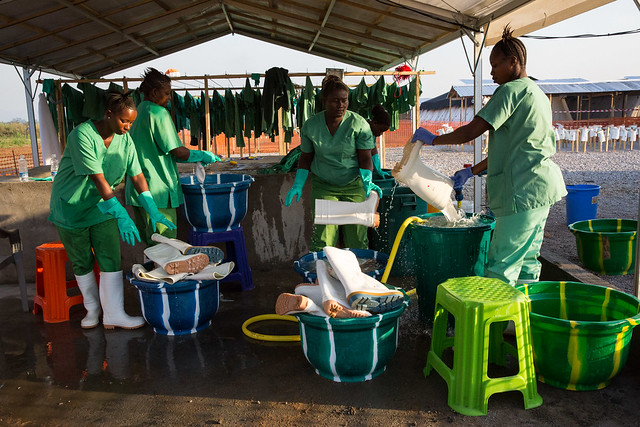Doctors Without Borders in Africa: 29 Nations of Hope and Healing
Doctors Without Borders in Africa: 29 Nations of Hope and Healing
29 African Countries Partner with Médecins Sans Frontières to Deliver Critical Care
 |
| Doctors Without Borders Ebola Donka National Hospital in Conakry, Guinea Africa |
In Africa 29 African Countries Work With Doctors Without Borders
Doctors Without Borders Motto is Medical aid where it is needed most. Independent. Neutral. Impartial.One-third of adults in Eswatini are HIV positive, which also increases their vulnerability to TB and other infections. Doctors Without Borders assisted the Ministry of Health with prevention and care in Shiselweni region in 2018.
Doctors Without Borders offers community-based testing for HIV and TB, oral HIV self-testing for hard-to-reach groups such as sex workers and men who have sex with men, and pre-exposure prophylaxis (PrEP) for people at increased risk of HIV infection. A total of 5,296 people accessed HIV self-testing and 468 were initiated on PrEP in 2018.
Ethiopia hosts the second-highest number of refugees in Africa – more than 900,000 at the end of 2018, mostly from South Sudan, Somalia, and Eritrea. Doctors Without Borders continues to fill gaps in health care and respond to emergencies affecting local communities, internally displaced people, and refugees.
In 2018, Doctors Without Borders supported the health ministry to respond to numerous outbreaks of water-borne diseases across the country, including the second-biggest cholera epidemic in its history, which started in the capital, Harare. In all, there were four cholera outbreaks and another four typhoid outbreaks, during which Doctors Without Borders teams supported the Ministry of Health and Child Care to treat over 13,000 suspected cases.
Over 13 percent of people, aged 15-49 in Mozambique are living with HIV, an estimated 2.1 million individuals and 34,000 of them are co-infected with tuberculosis (TB). Mozambique is one of the countries with the highest rates of HIV and TB worldwide.
List of African Countries Working With Doctors Without Borders
- Angola
- Burkina Faso
- Burundi
- Cameroon
- Central African Republic
- Chad
- Côte d'Ivoire
- Democratic Republic of Congo
- Eswatini
- Ethiopia
- Guinea
- Guinea-Bissau
- Kenya
- Liberia
- Libya
- Malawi
- Mali
- Mauritania
- Mozambique
- Niger
- Nigeria
- Sierra Leone
- South Africa
- South Sudan
- Sudan
- Tanzania
- Uganda
- Zambia
- Zimbabwe
Doctors Without continued to assist people affected by the violence in Borno and Yobe states throughout 2018, while maintaining a range of basic and specialist health care programs and responding to other emergencies across the country. During the year, our teams conducted over 247,400 outpatient consultations, assisted more than 5,000 births treated 15,700 children for malnutrition and 27,400 people for malaria.
In South Sudan health care is scarce or non-existent in many parts of the country, with less than half the population estimated to have access to adequate medical services. Around 80 percent of services are delivered by non-governmental organizations such as Doctors Without Borders.
 |
| Ebola treatment center in Maghuraka, Sierra Leone |
For four years, the MSF trauma center in Kunduz Afghanistan was the only facility of its kind in northeastern Afghanistan, offering essential medical and surgical care.
On Saturday, October 3, 2015, US forces bombed the hospital. Doctors Without Borders states, this was a blatant breach of International Humanitarian Law. Why? Because Under International Humanitarian Law hospitals in conflict zones are protected spaces.
Twelve MSF staff and 10 patients, including three children, were killed, and 37 people were injured, including 19 members of the MSF team.
 |
| Medical staff volunteering with Doctors Without Borders |
These statements imply that Afghan and US forces working together decided to raze to the ground a fully functioning hospital, which amounts to an admission of a war crime." Dr. Joanne Liu, Doctors Without Borders International President.
During the 30-minute airstrike, the intensive care unit, emergency rooms, and physiotherapy ward were targeted; the surrounding buildings in the compound were left virtually undamaged. Doctors Without Borders, national and international humanitarians are calling for an #IndependentInvestigation.
Doctors Without Borders states “We need answers, not just for us but for all medical and humanitarian staff assisting victims of conflict, anywhere in the world. The preserve of health facilities as neutral, protected spaces depends on the outcome of a transparent, independent investigation.”
 |
| Doctors Without Borders is an international, independent, medical humanitarian organization working in over 70 countries. |
About African Healers and Witchdoctors
About African Night Running


